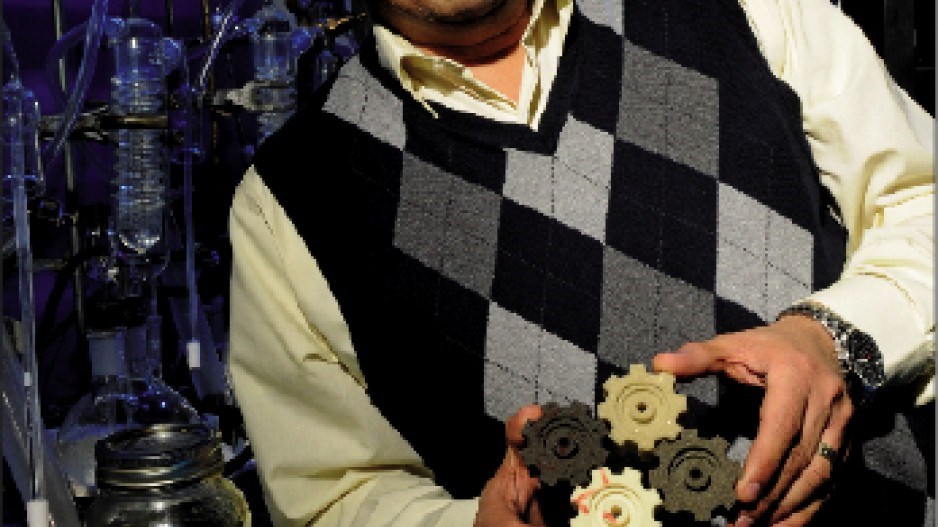Like plastic, polyurethane is a highly versatile petrochemical product.
Part of an $80 billion industry, polyurethane foam is used in insulation panels for construction, the automotive industry for seats and seals, and in bedding, carpets, furniture and shoes.
But unlike plastic, it is not widely recycled. Every year, 720,000 metric tonnes of the product ends up in North American landfills, according to Kambiz Taheri, an Iranian chemical engineer and founder of Polymer Research Technologies.
Taheri has developed a chemical process that turns waste foam into a liquid – Recyclopol, he calls it – which can then be turned back into foam products. He plans to build a conversion plant in Burnaby this summer and already has negotiated licensing deals with companies that want to use the product.
In the first two years, Taheri estimates the Burnaby plant would divert 5% to 10% of the 700,000-plus metric tonnes currently being thrown away, and then would ramp up from there with each new plant that is built.
Born in Iran, Taheri studied in England, earning a degree in chemical engineering, a master’s in science, a master’s in industrial management and an MBA. He has spent 25 years working in polyurethane chemistry in England, the U.S. and Iran. He was drawn to Canada to start his company, he said, because it offers good incentives for clean-energy companies.
Polymer isn’t the only company turning polyurethane into polyol – the main constituent of polyurethane foam. InfiChem Polymers in Michigan also uses a chemical process to recycle polyurthane waste. Chrysler uses its product in the seats of its new Grand Cherokee.
Taheri said InfiChem’s chemical process is multi-stage, whereas his is a single-stage process, which he said is less capital intensive. That process has been independently validated by Kemetco Research Inc.’s lab in Richmond.
“It works – we’ve got photos,” said Kemetco president Norman Chow. “It’s not a very complicated process, once you’ve got it all worked out. I guess the hard part is working it all out.”
The potential market is so big, Taheri said he’s not worried about sharing it with competitors.
“With the growth of the automotive and construction industry, polyurethane is going to be around for a long time,” he said.
While Taheri’s company has received good government support throughout the R&D process, and has struck partnership deals with other companies, his big challenge now is to raise the $2.2 million he needs to build a pilot plant in Burnaby and then ramp up to a full-scale commercial operation.
Once the plant is built, it will not take long before the company will be making money as the company already has several large manufacturers interested in buying its product, Taheri said.
“What they really need is enough money to build this first plant, which would be a revenue-producing plant,” said Bob de Wit, CEO?of GreenAngel Energy Corp.
The one stumbling block is that the project is smaller than what most venture capitalists typically invest in, but a bit too big for most angels. Even so, deWit thinks the company’s prospects for raising capital are good.
“It’s a small amount of capital to be cash-flow positive,” he said. “That makes it a really interesting deal. Once it’s cash-flowing, they wouldn’t necessarily need more equity after that. I think their prospects of raising capital are actually quite good.”
Polymer last year won the New Ventures BC competition ($130,000) and has received $120,000 from Industrial Research Assistance Program (IRAP). Taheri said he has also raised some money from angel investors. The Burnaby plant will take scrap foam from Kingspan Group’s Langley plant to produce 17,000 litres of Recyclopol over a six-month period, then ramp up to 170,000 litres per month once the plant is in commercial operation.
Taheri said he is already negotiating with a number of companies interested in licensing agreements, including Unicell Holdings in South Africa.
“They would want to license the technology to collect polyurethane waste in South Africa and convert it into a recycled product,” he said.
Noram Engineering and Constructors Ltd. will build the Burnaby plant, which Taheri hopes to see in operation by July.
“We will also be building a second plant for the same capacity probably in Ontario,” Taheri said, adding it is important to have a plant in Ontario where some large Canadian polyurethane manufacturers are located. •




